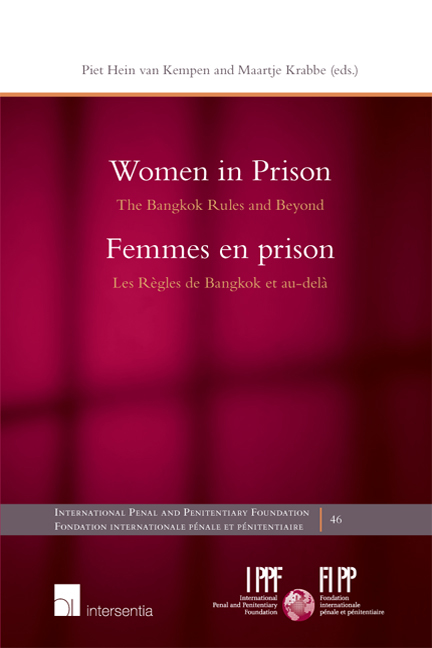Book contents
- Frontmatter
- Foreword
- Avant-propos
- Acknowledgements
- Remerciements
- Contents
- Part I Introductory Synthesis and Analyses: 1ÈRE Partie Synthèse ET Analyses Introductives
- Women in prison: a transnational perspective
- Femmes en prison: une perspective transnationale
- Part II Themes: 2ÈME Partie Thèmes
- Part III National Reports: 3ÈME Partie Rapports Nationaux
- Appendix The Bangkok Rules: Annexe Règles De Bangkok
- The International Penal and Penitentiary Foundation: History and Purpose
Women in prison: a transnational perspective
from Part I - Introductory Synthesis and Analyses: 1ÈRE Partie Synthèse ET Analyses Introductives
Published online by Cambridge University Press: 25 September 2018
- Frontmatter
- Foreword
- Avant-propos
- Acknowledgements
- Remerciements
- Contents
- Part I Introductory Synthesis and Analyses: 1ÈRE Partie Synthèse ET Analyses Introductives
- Women in prison: a transnational perspective
- Femmes en prison: une perspective transnationale
- Part II Themes: 2ÈME Partie Thèmes
- Part III National Reports: 3ÈME Partie Rapports Nationaux
- Appendix The Bangkok Rules: Annexe Règles De Bangkok
- The International Penal and Penitentiary Foundation: History and Purpose
Summary
INTRODUCTION TO THIS VOLUME
Women are a minority in prison. Currently, of the 10.35 million prisoners worldwide, 6.8% is female and their number is rapidly growing. Due to the comparatively low number of female inmates, prison policies have traditionally developed in response to the behavior of men. Little consideration has been given to the impact of those policies on women. Research on women in prison demonstrates, however, that female prisoners diverge from their male counterparts in that (i) they generally end up in prison for different reasons and, once in prison, (ii) they have other needs. For example, women are more frequently incarcerated for drug-related offences and less for violent crimes than men, women have an increased sensitivity to a whole range of mental problems and women rarely need the excessive security measures that many male prisoners require.
The fact that prison systems are male-oriented, in combination with the different needs of female prisoners, raises questions as to the efficiency of current systems. Generally, prison policy has to work towards the goals of imprisonment, such as serving a sentence (including retribution), rehabilitation, re-socialization and deterrence (general and special prevention), and incapacitation. Yet the approach to attain these goals may be different in the case of women. Meanwhile, not only efficiency matters require attention with regard to women in prison, human rights concerns may be raised as well. Women in prison are a vulnerable minority. Other (or more) than men, they may have to deal with hygiene needs related to reproductive health, motherhood, lack of financial resources, intimidating male staff, abusive (ex-)partners and other gender-specific matters.
The 2010 United Nations Rules for the Treatment of Women Prisoners and Non-custodial Measures for Women Offenders (Bangkok Rules) - the central theme of this volume - address both human rights matters and efficiency issues relevant to women in prison. The Bangkok Rules, for example, prohibit the use of instruments of restraint on women in labor (human rights), but also promote non-custodial measures for women, in order to fuel re-socialization (efficiency). Contained in a General Assembly resolution, the Bangkok Rules enclose soft law, in the words of the resolution “global aspirations … addressed to prison authorities and criminal justice agencies.” However, as this volume demonstrates, many of the Bangkok Rules have already been implemented on a global level.
- Type
- Chapter
- Information
- Women in PrisonThe Bangkok Rules and Beyond, pp. 3 - 34Publisher: IntersentiaPrint publication year: 2017
- 1
- Cited by



